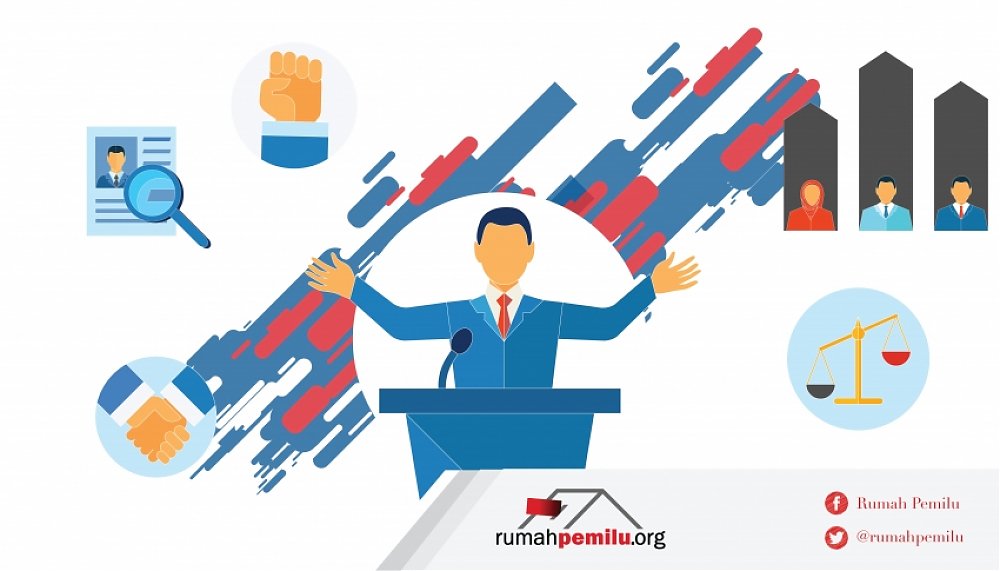On December 9, 2020, 269 regions in Indonesia conducted voting and counting in the pandemic, transitioning local governments. There are 270 regional plans but due to mass protests of supporters of the candidates after the election of Boven Digoel, the vote count in Papua Province was postponed.
The fact of the country's implementation makes us continue to question the reasoning of the power of the government of this republic. As it turns out, the acceptable aspirations of delaying the 2020 elections are in the form of violence and destruction of public and private property. What the ruling heard was the anger of a mob of supporters because the spouse of his former corrupt candidate was aborted by the Electoral Commission.
All this time, scientific arguments were ignored by the authorities. All doctors and medics who are struggling to deal with the pandemic have submitted infected data and the significant Covid-19 death toll is increasing. Cross-field experts have already presented their scientific explanations on the health and life threats from Covid-19 if state administration such as local elections ignores the protection of citizens.
So far, the aspirations of a more representative and measurable and democratic public are ignored by the ruler. News reports and survey results illustrate the majority of citizens want elections postponed. Many legal civil society organizations such as Muhammadiyah and Nahdatul Ulama are urging the postponement of elections until the situation in the pandemic can be controlled.
What happened, the ruler in the government from, by, to this people still organized the transition of power even though the owner of his sovereignty refused. Simultaneous elections are held all of a sudden. The ruler forgets, or has been foolish, with the protection of suffrage, the right to security, the right to life, and the healthy rights of all nations guaranteed by the constitution as a sign of the purpose of the establishment of the state. On the contrary, the government that runs the country tends to enlarge its power. Obesity powers this country tends to ignore the constitutional rights of its citizens.
Law as a streamlining of power
Murray N. Rorthbard in "Anatomy of The State" (2009) explains that the limits of state power are the law. Without the law, power becomes authoritarian. He will do anything, even ignore our autonomy and ownership rights as citizens.
Rorthbard describes such an important law as a limitation of power, with a reminder of history. Power was once owned by a single party and then changed with the recording of rules and the division of power. The king who claims to have power from God is limited by the writing of the law, what is claimed to be the power of God. Through the writing of this law by itself power becomes limited because the forms of power are only limited to what is written.
So is the case with parliamentary government. Originally, the written law restricted, what was the power of the government, and what was the power of the people's party represented in parliament. If Rorthbard's story is to be extended with the presidential administration, this is also a form of restriction of the power of the number one person such as the unconstitutional king (written into law).
From his experience, the power of state administration tends to expand and intervene in the private sphere and the human rights of its citizens. Because of this, Rorthbard's opinion, the law should be a deprivation of state power that should indeed be limited. Thus, important state power is restored to its basic namely protecting and serving the rights of citizens. This is what in the Constitution of 1945 the Republic of Indonesia is referred to as the state goal, protecting the entire nation.
Rorthbard's explanation is relevant to the knife analysis of the state's elections. The law is the limit of the power of the ruler of the state and the Law on Elections is a law made by the ruler of policy makers to maintain and even expand its power.
The International Initiative Design Electoral Assistance (IDEA) also concluded that a legal framework at the legal level is needed in the Covid-19 elections. The goal is to keep state power functioning to protect the constitutional rights of its citizens in pandemics. Law at the legal level must regulate the variety of time and form of suffrage services because pandemics are an expanse that threatens the health and lives of citizens. Election time can be multiplied through early voting. Election hours can be added, not just 7:00 to 13:00. The way and the election media can be made as diverse as by postal mail and mobile phones, PCs, or laptops with internet, as well as drive thru like ordering a fast food restaurant meal through a private vehicle. All to protect the suffrage and the right to a healthy life of its citizens.
Based on the experience of countries that hold elections in pandemics, countries that revise election laws with the provision of voting rights services, campaigns, and law enforcement in the context of the outbreak, resulting in a lively, free, and fair democratic party. Beyond this, the governments of countries become obese in power in the name of state and social stability in the pandemic crisis. International IDEA calls on sovereign citizens to stand up for democracy.
Indonesia based on this emphasis can enter as a country that is obese power. The processes of state administration such as elections that should be very likely to be limited based on the law in the context of a pandemic, even continue to be carried out. Poor quality electoral laws in the normal era are not updated in a new era of normalcy. Based on the September 21, 2020 meeting, the authorities put forward a number of criminal convictions for elections in a pandemic without increasing the protection of suffrage, the right to security, the right to health, and the right to life.
State authorities have only changed the terms of the postponement of the election vote. From the authority of the President, the Replacement Government Regulation Law (Perppu) 2/2020, then enacted into Law 6/2020. In the Explanation section of Article 201A paragraph (3) it reads, Simultaneous voting in December 2O2O is postponed and rescheduled if it cannot be implemented because the national disaster of the Corona Virus Disease 2O19 (COVID-19) pandemic has not ended. Covid-19 is not only not only not over in Indonesia but also getting higher and harder to control and then we are partying in the power of the people without laws that protect it.
This is a sign, the power of the state is well liked by some who usually on behalf of the people. Elections continue to be forced to legalize the continuation of his control of the country.
One of the differences between democracy and other krasi is the participation of citizens. All forms of participation convey delays and recommendations of legal provisions have been ignored. Then, the percentage of voting rights users who can describe the quality of participants, organizers, and voters in elections and democracy is ignored. Obesity power in the 2020 elections then so have the slogan "from, by, and for the ruler himself", not the people.
USEP HASAN SADIKIN











